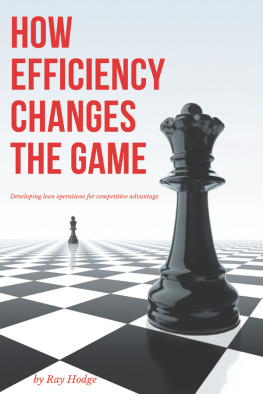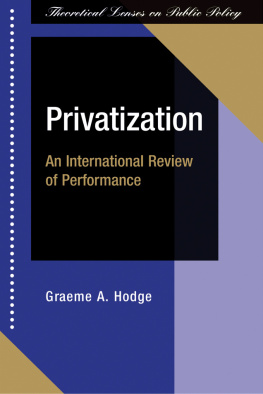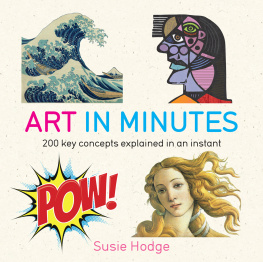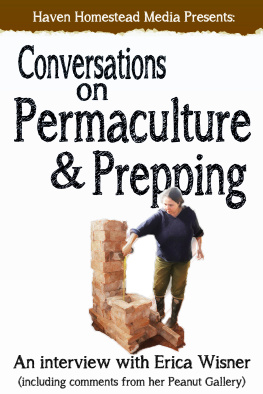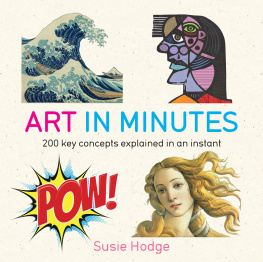Ray Hodge - How Efficiency Changes the Game
Here you can read online Ray Hodge - How Efficiency Changes the Game full text of the book (entire story) in english for free. Download pdf and epub, get meaning, cover and reviews about this ebook. year: 2021, publisher: Business Expert Press, genre: Business. Description of the work, (preface) as well as reviews are available. Best literature library LitArk.com created for fans of good reading and offers a wide selection of genres:
Romance novel
Science fiction
Adventure
Detective
Science
History
Home and family
Prose
Art
Politics
Computer
Non-fiction
Religion
Business
Children
Humor
Choose a favorite category and find really read worthwhile books. Enjoy immersion in the world of imagination, feel the emotions of the characters or learn something new for yourself, make an fascinating discovery.
How Efficiency Changes the Game: summary, description and annotation
We offer to read an annotation, description, summary or preface (depends on what the author of the book "How Efficiency Changes the Game" wrote himself). If you haven't found the necessary information about the book — write in the comments, we will try to find it.
How Efficiency Changes the Game — read online for free the complete book (whole text) full work
Below is the text of the book, divided by pages. System saving the place of the last page read, allows you to conveniently read the book "How Efficiency Changes the Game" online for free, without having to search again every time where you left off. Put a bookmark, and you can go to the page where you finished reading at any time.
Font size:
Interval:
Bookmark:

How Efficiency Changes the Game
How Efficiency Changes the Game
Developing Lean Operations for Competitive Advantage
Ray Hodge

How Efficiency Changes the Game: Developing Lean Operations for Competitive Advantage
Copyright Business Expert Press, LLC, 2021.
Cover design by Charlene Kronstedt
Interior design by Exeter Premedia Services Private Ltd., Chennai, India
All rights reserved. No part of this publication may be reproduced, stored in a retrieval system, or transmitted in any form or by any meanselectronic, mechanical, photocopy, recording, or any other except for brief quotations, not to exceed 400 words, without the prior permission of the publisher.
First published in 2021 by
Business Expert Press, LLC
222 East 46th Street, New York, NY 10017
www.businessexpertpress.com
ISBN-13: 978-1-63742-044-7 (paperback)
ISBN-13: 978-1-63742-045-4 (e-book)
Business Expert Press Supply and Operations Management Collection
Collection ISSN: 2156-8189 (print)
Collection ISSN: 2156-8200 (electronic)
First edition: 2021
10 9 8 7 6 5 4 3 2 1
Michelle
Meeting you by chance in the back row of a plane and subsequently
proposing to you in the front row, some 12 months later, changed
my life. Thank you for your love, belief, and ongoing support.
Description
Obtaining a competitive advantage in todays business environment generally does not happen of its own accord. With the speed of change in technology, products to market, and customer preferences, organizations must strive to keep on the edge and be the drivers of change. Given that most businesses deal with the same buyers in defined markets who purchase similar products, gaining this competitive advantage is critical to both thriving and being leaders in their field. To do this, one must drive efficiencies throughout the entire organization while creating a significant point of difference. Yet, inefficiency continues to run rampant and can be found in the often forgotten pockets of the organization, hampering efficacy at best, leading it out the door at worst.
How Efficiency Changes the Game: Developing Lean Operations for Competitive Advantage provides an insightful process for the executive, manager, and business owner, enabling them to discover inefficiencies where least expected, highlighting both the nature of the primary issues and then how to subsequently correct them. This book will assist in developing lean operations in areas such as leadership, marketing, strategy and planning, sales, time management, workflows, finances, and people.
Keywords
time; process; work; business; sales; change; customer; management; marketing; strategic; efficiency; leadership; competitive advantage; employees; lean
Contents
For more than 40 years I have worked with leaders in publicly traded companies, privately held business, and military organizations to help them find the answers to the recurring question: What will help us grow? My answer never varies: It starts with a smart leader with a vision of what the organization can be tomorrow rather than what it is today. Ray Hodge has taken this observation a step further to offer pragmatic advice about what it takes to create these tomorrows.
Ray understands that a breakthrough product, dazzling service, or cutting-edge technology can put you in the game, but only rock-solid execution of a well-developed strategy can keep you there. You must be able to deliverto translate your brilliant strategy and operational decisions into actionand you need to do it more efficiently than the competition does.
If youre like many leaders, however, in an effort to improve performance, too frequently you address the symptoms of dysfunction, not the root causes of it. You focus your attention and that of others on whats going wrong instead of why it doesnt work.
As Ray points out, it all starts with a strong strategic principlea shared objective about what the organization wants to accomplish. Clear strategy leads the process; great performance completes it. However, the two should not be confused. Strategy is an over- and misused term to describe anything important, and strategic planning is an oxymoron. Leaders formulate the strategy; they plan the executionor at least the successful ones do. Execution involves discipline; it requires senior leader involvement; and it should be central to the organizations culture. Done well, execution pushes everyone to decipher their broad-brush theoretical understanding of the strategy into intimate familiarity with how it will work, who will take charge of it, how long it will take, how much it will cost, and how it will affect the organization overall.
Effective tactics form the foundation of execution, but the two differ. Tactics are the activities that lead to execution, but by themselves, they arent enough. Execution shapes strategy, and strategy defines execution. Strategy formulation involves asking What? Execution is a systematic process of rigorously discussing how? questioning, tenaciously following through, and ensuring accountability. It includes linking the organizations mission, vision, and strategy to implementation, creating an action-oriented culture of accountability, connecting the strategy to operations, and robust communication. When leaders execute effectively, they get smart answers to their questions.
How Efficiency Changes the Game certainly explains the links between efficiency and productivity, but it does more. It clarifies what the game needs to be and how leaders can use their influence to disrupt that status quo to create all new games, ones of their own creation and ones for which they have set the rules. Disruptive LeadersTM see disruption as positive and mandatory, and they understand that if they dont cause the disruption, someone else will.
Joseph Schumpeter, one of the most influential economists of the early 20th century, popularized the term creative destruction to warn against the repetitive process of recycling the old into new. According to him, the economy is a living organism that constantly grows and adapts to changes. Over the years, Schumpeter has garnered much attention and worldwide approval and has helped mankind advance through the economic world. We should now think of Ray Hodge as Schumpeters modern-day disciplethe person who will help us understand what we must do to emerge from the global pandemic.
Creative destruction involves the dismantling of long-standing practices to make way for innovation. Schumpeter originally advocated creative destruction in manufacturing processes that increase productivity and described creative destruction as the process of industrial mutation that incessantly revolutionizes the economic structure from within, incessantly destroying the old one, incessantly creating a new one. Recently we have started to use the term in other industries, especially those that rely heavily on technology.
Creative destruction describes the deliberate dismantling of established processes that make way for improved methods of production. Ray takes Schumpeters ideas a step further to offer key insights:
Rest is the fertile soil from which quality work springs.
We tend to look at the past to learn from mistakes, but too few leaders deconstruct their success, much less celebrate them. Intentionally reflecting allows a clearer view of the past and a more optimistic vision of the future.
Font size:
Interval:
Bookmark:
Similar books «How Efficiency Changes the Game»
Look at similar books to How Efficiency Changes the Game. We have selected literature similar in name and meaning in the hope of providing readers with more options to find new, interesting, not yet read works.
Discussion, reviews of the book How Efficiency Changes the Game and just readers' own opinions. Leave your comments, write what you think about the work, its meaning or the main characters. Specify what exactly you liked and what you didn't like, and why you think so.

